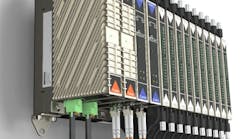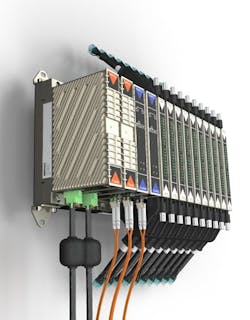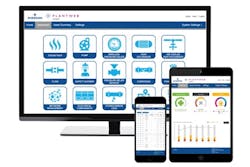Since 1964, every two years Chemical Processing has bestowed Vaaler Awards on products that promise to significantly improve the operations and economics of plants. This year’s awards were open to entries that were commercialized in the United States between May 2015 and June 2017.
The awards are named after John C. Vaaler (1899–1963), chairman of Chemical Processing’s Editorial Board from 1961 until his death. He became editor-in-chief of Chemical Processing in 1946, after 24 years in the chemical and related industries.
An impartial panel judges the entries. It consists of the members of Chemical Processing’s Editorial Board — a group of technical professionals with diverse responsibilities and from a variety of industry sectors (see sidebar). The panel assessed 15 entries in 6 categories for technical significance, novelty or uniqueness, and breadth of applicability. The judges weren’t obliged to confer any awards — but did decide to honor two products:
• Bedrock Automation for its Open Secure Automation System; and
• Emerson Automation Solutions for Plantweb Insight.
Control System Boasts Unrivalled Cyber Security
The threat of safety, environmental or other incidents caused by vulnerabilities in process control systems is prompting plants to pay increasing attention to cyber security and, indeed, to make protecting their operations from cyber attacks a top priority. However, conventional control systems were developed before cyber security was an issue, notes Bedrock Automation. So, these control systems must resort to bolt-on defensive technologies such as firewalls, which add costs and provide limited value, it says. Bedrock instead started with a clean sheet of paper and developed a control system in which military-grade cyber protection is intrinsic and transparent to users. The result is an open and secure high-performance control system, the company stresses.
Its Open Secure Automation System, which was commercialized in July 2015, is the simplest, most-scalable and most-secure control system available, states Bedrock. The system’s unique architecture features a pin-less electromagnetic input/output (I/O) backplane, functionality that surpasses that of any conventional programmable logic controller, remote terminal unit or distributed control system, and inherent cyber security, the company emphasizes.
Bedrock takes advantage of advances in semiconductor technology that weren’t available when the fundamental architectures of today’s leading control systems were developed. It boasts more than 40 patented technologies and a secure supply chain.
Its parent company manufactures semiconductors and Bedrock uses custom chips. Unique certificates and keys embedded in all its modules during production provide the basis for authentication of all hardware and software components. Any module that fails authentication is disabled. A recent upgrade enables authentication of the engineering environment, external I/O devices and third-party applications. The next upgrade will extend protection to the human level via smart cards and biometrics, the company says.
The system features all-metal module construction. This not only provides thermal and structural integrity but also passive and active tamper protection and hardening against electromagnetic interference and high-energy electromagnetic pulses (EMPs). The Open Secure Automation System is the first industrial system to be certified for EMP resistance, notes Bedrock.
The system includes a secure power module as well as secure I/O, which allow a 90% reduction in I/O module types for typical users, says the company.
Apps Inexpensively Provide Equipment Insights
Plants face increasing pressure to improve processes, reduce energy consumption and cut maintenance costs — without incurring significant capital costs. Success requires ensuring that equipment is running properly and at maximum efficiency. A key element in achieving this is identifying potential problems early before they can cause major issues such as a process shutdown. Plantweb Insight applications, which were announced in November 2016, ease analysis of data from wireless and wired instrumentation to solve equipment problems. Installation takes only a matter of days and return on investment typically occurs in a just few months, says Emerson Automation Solutions.
To take full advantage of the apps, plants should monitor all crucial equipment. Fortunately, notes the company, WirelessHART instrumentation provides an easy, low-cost option for gathering data from equipment for which running wires isn’t economical.
Plantweb Insight apps are a breakthrough in the way engineers monitor and diagnose equipment problems, states Emerson. They provide relevant-time actionable information and insights about abnormal situations, asset performance and health, energy costs, emissions, etc. Engineers even can view results on mobile devices such as smartphones and tables.
The apps include pre-packaged analytics based on decades of experience and feature a human-centered design and user-tested interface for consistent and intuitive navigation, notes the company. Moreover, the apps boast seamless system integration, simple installation and minimal configuration or setup.
Every application offers a similar look and feel. A dashboard page provides an aggregated view of the entire asset class being monitored and the most important insights. These insights vary from application to application and may reflect the current asset status and health, energy costs, emissions, critical alerts, etc. Concise trending of these insights also appears. An asset summary page gives a tabular view of the monitored assets on an asset-by-asset basis. The page is fully sortable, searchable and filterable for quick prioritization and identification. An asset details page supplies specifics on a particular asset, such as location and process, calculated insights, such as status, health, energy use and emissions, as well as a brief asset history.
Current apps cover steam traps, fixed-speed pumps, shell-and-tube heat exchangers, and wireless pressure gauges. The company says that more apps are coming soon.
The Judges
Dan Brown, process engineer, Eli Lilly, Indianapolis, Ind.
Vic Edwards, process safety consultant, Houston
Tim Frank, associate R&D director, Dow Chemical, Midland, Mich.
Fred Gregory, process safety and risk manager, Lubrizol, Deer Park, Texas
Julie O’Brien, director of sustainability, Air Products and Chemicals, Allentown, Pa.
Roy Sanders, process safety consultant, Lake Charles, La.
Ellen Turner, global market development manager, Eastman Chemical, Kingsport, Tenn.
Sheila Yang, principal engineer, Genentech, South San Francisco, Calif.





